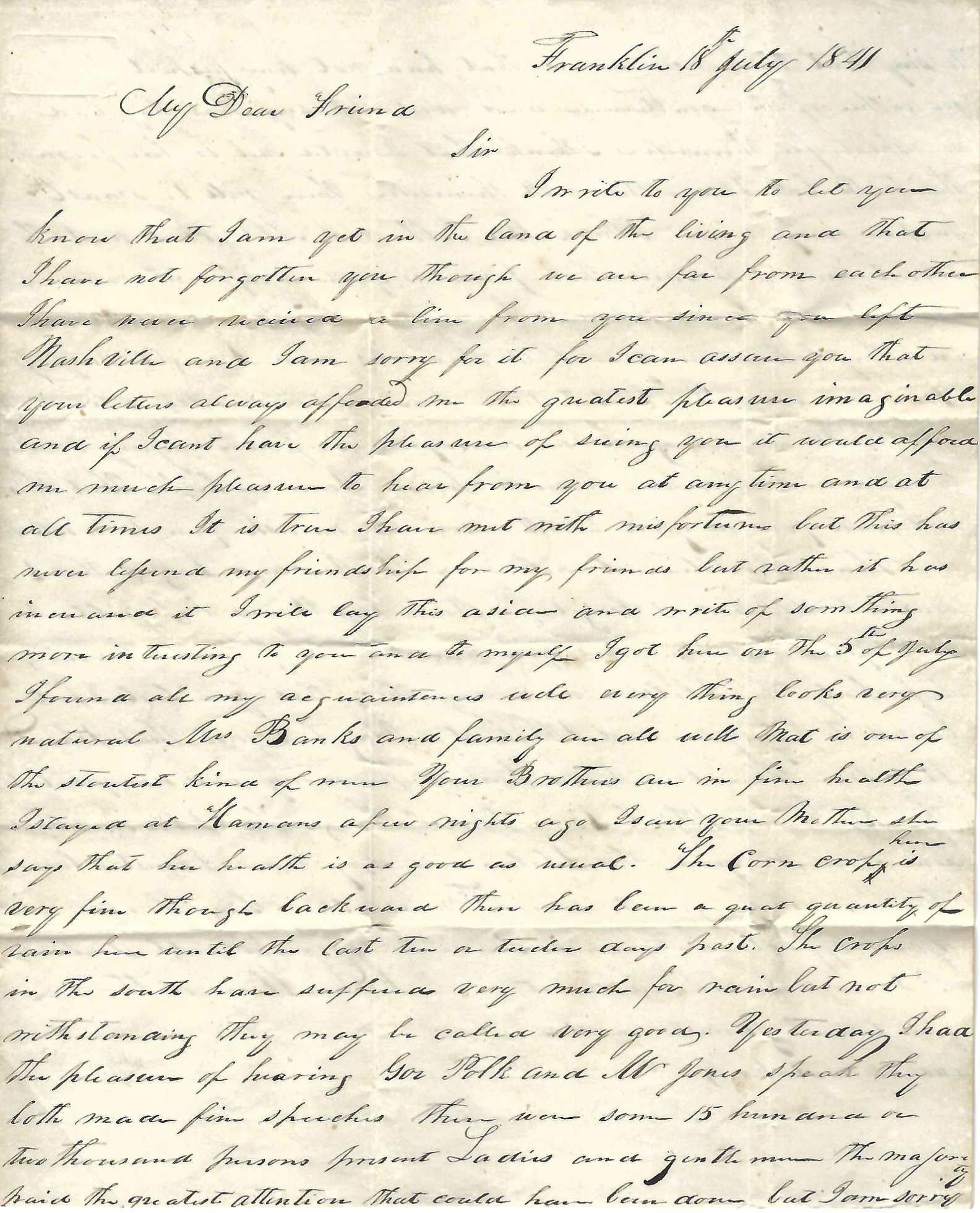Autograph Letter Signed, Franklin, Tennessee, July 18, 1841, to James M. Critz, Lewisburg, Virginia
- SIGNED
Quarto, two pages, plus stamp less address leaf, in very good, clean and legible condition.
1841 Future President Polk runs unsuccessfully for reelection as Governor of Tennessee.
Meredith writes in part:
"…I got here on the 5th of July…The corn crop here is very fine though backward… The crops in the south have suffered very much for rain but not withstanding they may be called very good. Yesterday, I had the pleasure of hearing Gov. Polk and Mr. Jones speak, they both made fine speeches, there were some 15 hundred or two thousand persons present, Ladies and gentlemen. The majority paid the greatest attention that could have been done but I am sorry to say that there were some that had not any respect for either of the gentlemen and were to say that they had no respect for themselves… I think Gov. Polk and Mr. Jones are both smart men, it is said that Jones is quite a different man from Gov. Cannon. I think that Jones and Polk are well matched. They both are smart to themselves and I might say to Tennessee also…"
When the writer heard James Polk speak in a rural city in Tennessee, south of Nashville, the former Speaker of the US House of Representative was the incumbent Jacksonian Democratic Governor running for reelection. It's odd that Meredith, writing to his friend Critz, a doctor and slave-owning farmer, thought Polk and his Whig opponent, "Lean Jimmy" Jones, were "well matched" as orators, because Jones was reputed to be a much more entertaining speaker and storyteller. In the election, a month later, Jones defeated Polk by a slim majority of 3,000 votes. Two years later, Polk tried again for the same office and again lost to Jones. With those defeats behind him, in 1844, Polk entered his party's convention as nothing more than a "dark horse" candidate for Vice President. But when no candidate for the Democratic presidential nomination could secure the necessary two-thirds majority, Polk emerged as the compromise nominee. He went on to defeat Whig Henry Clay for the Presidency, holding office as Commander in Chief during the victorious Mexican-American War.
1841 Future President Polk runs unsuccessfully for reelection as Governor of Tennessee.
Meredith writes in part:
"…I got here on the 5th of July…The corn crop here is very fine though backward… The crops in the south have suffered very much for rain but not withstanding they may be called very good. Yesterday, I had the pleasure of hearing Gov. Polk and Mr. Jones speak, they both made fine speeches, there were some 15 hundred or two thousand persons present, Ladies and gentlemen. The majority paid the greatest attention that could have been done but I am sorry to say that there were some that had not any respect for either of the gentlemen and were to say that they had no respect for themselves… I think Gov. Polk and Mr. Jones are both smart men, it is said that Jones is quite a different man from Gov. Cannon. I think that Jones and Polk are well matched. They both are smart to themselves and I might say to Tennessee also…"
When the writer heard James Polk speak in a rural city in Tennessee, south of Nashville, the former Speaker of the US House of Representative was the incumbent Jacksonian Democratic Governor running for reelection. It's odd that Meredith, writing to his friend Critz, a doctor and slave-owning farmer, thought Polk and his Whig opponent, "Lean Jimmy" Jones, were "well matched" as orators, because Jones was reputed to be a much more entertaining speaker and storyteller. In the election, a month later, Jones defeated Polk by a slim majority of 3,000 votes. Two years later, Polk tried again for the same office and again lost to Jones. With those defeats behind him, in 1844, Polk entered his party's convention as nothing more than a "dark horse" candidate for Vice President. But when no candidate for the Democratic presidential nomination could secure the necessary two-thirds majority, Polk emerged as the compromise nominee. He went on to defeat Whig Henry Clay for the Presidency, holding office as Commander in Chief during the victorious Mexican-American War.


